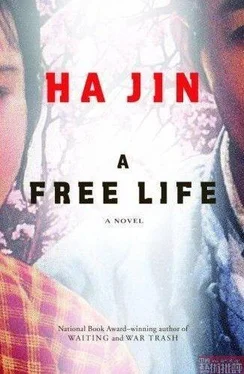There was no response. Then, to their amazement, the boy scurried into the kitchen, dragging his red suitcase, which now had a squashed corner. "I'm packing, leaving for home," he announced, his face sullen.
" What did you say?" his mother asked.
"I'm going back to Grandpa and Grandma."
That astounded his parents. After a brief pause, they burst out laughing. "Well, you're welcome to leave," Nan told him with a straight face.
The boy was puzzled. "I'm packing."
"Sure. Do it, quickly," Pingping urged.
Taotao let go of the suitcase, dropped down onto the floor, and broke out crying. "I miss Grandma and Grandpa!"
That frightened his parents, who had thought he was merely bluffing because they wouldn't go out with him to stargaze. His mother picked him up, sat him on her lap, wiped away his tears with her fingers, and rocked him gently. Nan said, "Come on, we'll watch stars when there are no clouds, all right?"
"You're already a big boy," his mother added. "You should know we can't go back anymore. We'll have to live here. China won't let us live in peace if we return. You know, Dad and Mom are going to work very hard so that we can have our own home someday."
The boy blubbered some more, snuffling fitfully. He seemed to understand most of what she was saying, and kept nodding his head.
Somehow, after that, he didn't want to go out to gaze at stars anymore, and the telescope was just propped beside the window at the landing upstairs. Once in a while he'd observe the sky with it, but every time he watched for only a minute or two. Soon he stopped missing his grandparents as well. Whenever he was naughty or disobedient, his parents would say they were going to send him back to China by the express mail, but this threat scared him for only a few months.
THESE DAYS Pingping was so happy that even her limbs felt lighter. An internal glow expanded in her, and a pinkish sheen frequently came over her face. She often hummed Chinese folk songs when she was cooking or sewing. Whenever she went shopping or to the post office, she'd take Taotao along as if the boy might disappear the moment she left him alone. Even when Taotao played within the yard, she'd accompany him. Behind Heidi's house, beyond the blueberry bushes, lay a tennis court, green and springy as if coated with rubber, surrounded by a tall steel fence. But the Wus didn't go there. Instead, they often kicked a volleyball under a basketball hoop in the front yard. Taotao played only soccer.
Pingping understood that the joyful days were temporary, because the summer would end soon-the Masefields would come back and she'd resume doing the housework. Furthermore, Taotao would begin school in early September, which might be hard for him. She had been reading children's books in English together with him for five or six hours a day. Since he watched a lot of TV, he had begun to pick up words, able to say "Uh-oh," "Okey-dokey," and even "Get lost." Having him with her, Pingping felt more certain how she would live. In the past years she had prepared herself mentally for returning to China, because Nan had planned to go back and teach at his alma mater, a small college in Harbin City. Yet whenever she dreamed of home, she'd have nightmares, in which she rushed around looking for a clean toilet but couldn't find one. Nan told her that modern restrooms had been put up in many Chinese cities lately; in fact, there had been a campaign to modernize the public facilities, and to use some of them you'd have to pay, like buying a cup of tea. Nan would joke, "Like no free lunch in America, there'll be no free bathrooms in China anymore. Too many people." Still, Pingping couldn't stop searching for a toilet in her dreams. But since Taotao came, her nightmares had mostly stopped and her head had grown clearer. Even if Nan changed his mind and returned to China someday, she'd live in America raising their child alone. She was sure of that.
Nan had come to the United States alone in the summer of 1985. A year and a half later Pingping had managed to leave China. But the officials wouldn't allow her to bring Taotao along for fear she might not return, so the boy stayed with her parents in Jinan City, a provincial capital more than two hundred miles south of Beijing. Soon after her arrival in Boston, Pingping told Nan that she wanted to save $20,000 before they went back home. That astonished Nan, to whom the figure was unreasonable, though he already had more than $3,600 in the bank. He had never cared about getting rich and would tease her, saying she was a born capitalist. Yet Pingping wanted financial independence, which meant a tidy sum in their bank account so that they wouldn't worry about getting a raise that had to be approved by officials at whose feet many people would grovel. So she resolved to make money and save as much as possible while they lived here. Among his compatriots at Brandeis, Nan was known as a rich man after his first year at the school, mainly because he had worked constantly to earn the money needed for his wife's visa-the U.S. embassy in Beijing required a bank statement that showed at least $3,000. Unlike the graduate students in the science departments, Nan didn't have a stipend and had to take care of his own living expenses. To save time for his study, he'd cook himself huge meals, each of which he'd eat for half a week. Sometimes he slept only three or four hours a day. He lived such an industrious life that he had lost more than twenty pounds by the time Pingping came to join him.
Two and a half years later, after Pingping had worked in a nursing home for a year and then for Heidi for a year and a half, and after Nan had done various odd jobs, the Wus had saved $30,000. Yet this sum didn't give them any sense of security, because now they were planning to live here permanently. If Nan quit his Ph.D. candidacy,
Pingping wasn't sure what he was going to do. Though she knew he didn't love her, she loved him deeply. Before she'd married him, her father had warned her that she might not live a secure life with Nan, who, though a decent young man, was by nature impractical, an incorrigible dreamer. Yet she had never regretted being his wife, though she did feel hurt from time to time and was even tempted to drink (though she disliked American wines and there was no way to find the kind of fragrant Luzhou liquor here, of which she had used to pilfer mouthfuls from her father's bottles when she was a child). She was certain Nan wouldn't just walk out on her. For better or worse, he was trustworthy and dependable. Now that Taotao was here, Nan was all the more willing to be the head of the household. In his own words, "To be the draft horse pulling the cart of this family."
"I'll look for a full-time job soon," he told Pingping one afternoon. Their son was napping in the other room.
"What kind of jobs do you have in mind?"
" Do I have a choice? " Again a caustic edge sharpened his voice.
"Don't be nasty. I always can work too."
That mollified him some. He sighed, "I'll keep my eyes open for jobs."
Pingping remained silent, feeling guilty because Heidi didn't pay her during the summer. They had spent thousands of dollars recently and couldn't afford to stay home eating away their savings. Yet she wanted to teach Taotao some basics before his school started, so it was Nan who needed to look for a job.
It was reported that the U.S. government was going to issue green cards to the Chinese students who did not intend to return to China. Professor Nicholson in Nan's department, a specialist in American domestic policy, had assured him that the United States would definitely keep the Chinese students here. This baggy-eyed scholar said to Nan, "Believe me, any country will be willing to have the cream of China 's young generation." That was probably true. Indeed, both Canada and Australia had just granted permanent residency to all the Chinese students and scholars living there. Pingping and Nan felt relieved to know they wouldn't have to spend thousands of dollars and wait years for green cards like most immigrants. Still, they were unsettled. Mentally they were not prepared for such a new life.
Читать дальше












